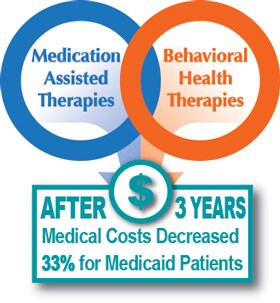 Substance use disorders (SUD) affect the lives of millions of Americans, including Medicaid beneficiaries. Nearly 12 percent of people over age 18 with Medicaid coverage have a substance use disorder (SUD). In 2009, Medicaid accounted for 21 percent of U.S. spending on services for people with SUD.
Substance use disorders (SUD) affect the lives of millions of Americans, including Medicaid beneficiaries. Nearly 12 percent of people over age 18 with Medicaid coverage have a substance use disorder (SUD). In 2009, Medicaid accounted for 21 percent of U.S. spending on services for people with SUD.
State Medicaid agencies are developing new ways to address SUD, using Integrated Physical and Behavioral Health strategies. For example, Medicaid benefits can include Medication-Assisted Treatment, which uses a combination of FDA-approved medications and evidence-based behavioral therapies to provide a whole-patient approach to treatment, helping individuals recover safely and at a substantial cost-savings. Medical costs decreased by 33 percent for Medicaid patients over three years following their engagement in such treatment. This included a decline in expenditures in all types of health care settings including hospitals, emergency departments, and outpatient centers.
In Rhode Island, Medicaid patients who are opioid-dependent may receive Medication-Assisted Treatment under Medicaid’s person-centered health home provision. Patients have an assigned nurse and case manager to monitor their healthcare needs and assist with a range of activities that support recovery and wellness. Patients say the program offers an individualized and humanizing approach to establishing a connection to health care, promotes self-care and management, provides a safe and caring environment, fosters hope and acknowledges their values, preferences, and expressed needs. Learn more (PDF, 163.14 KB) (PDF 163.14 KB) about how states are using Medicaid to provide Medication Assisted Treatment.
CMS is offering links/charts for informational purposes only, facts should not be construed as an endorsement of the organization's programs or activities
